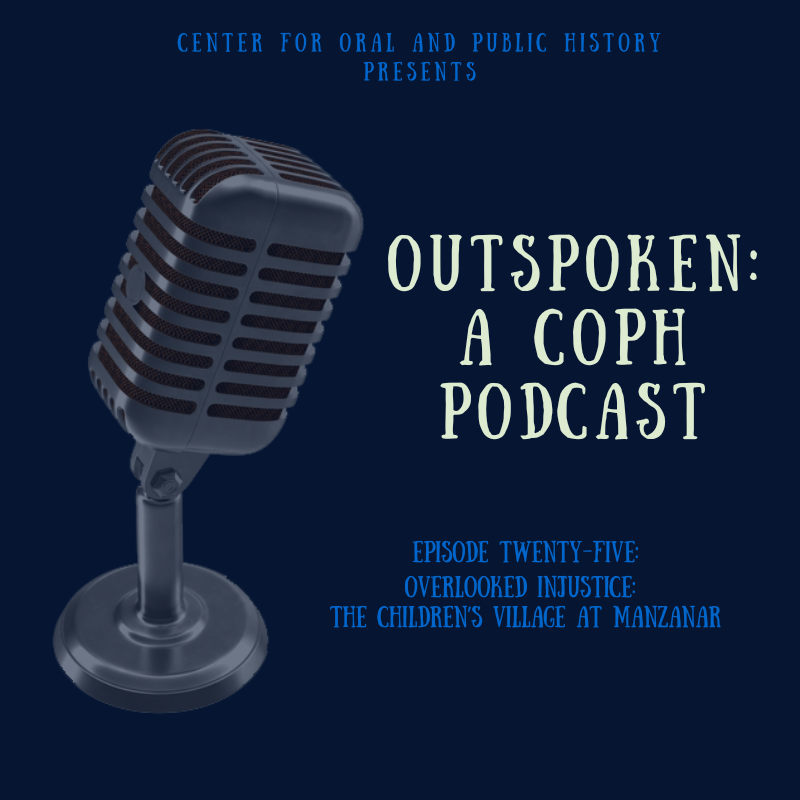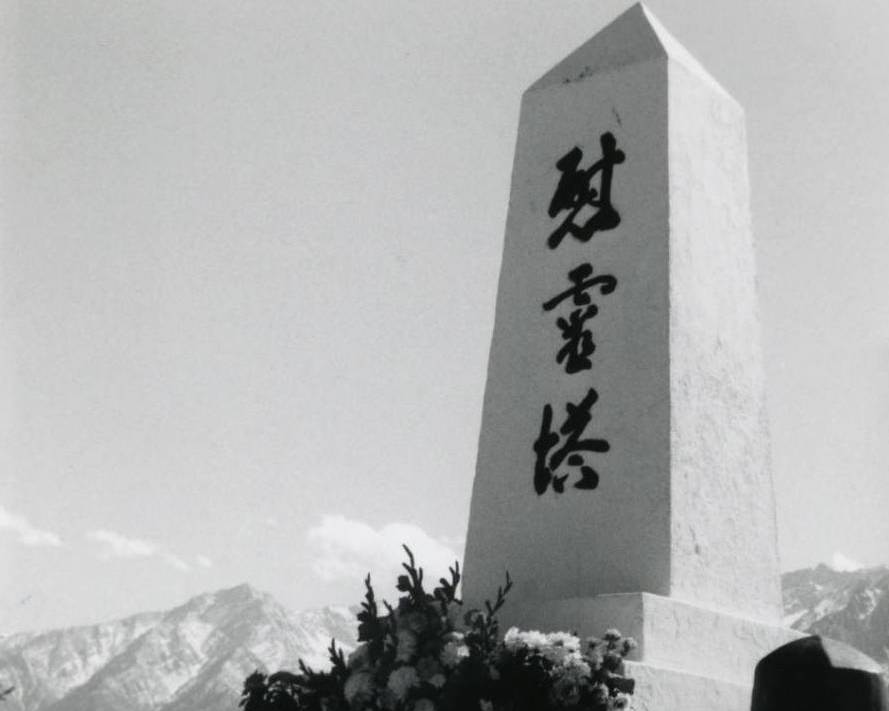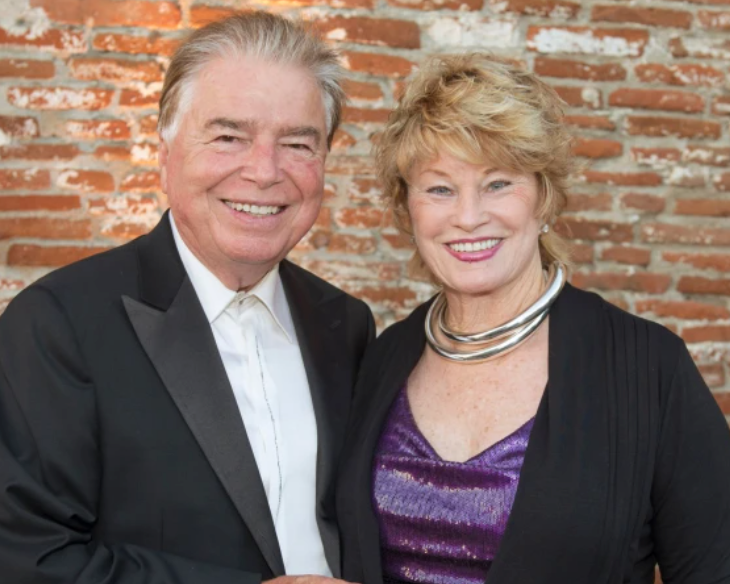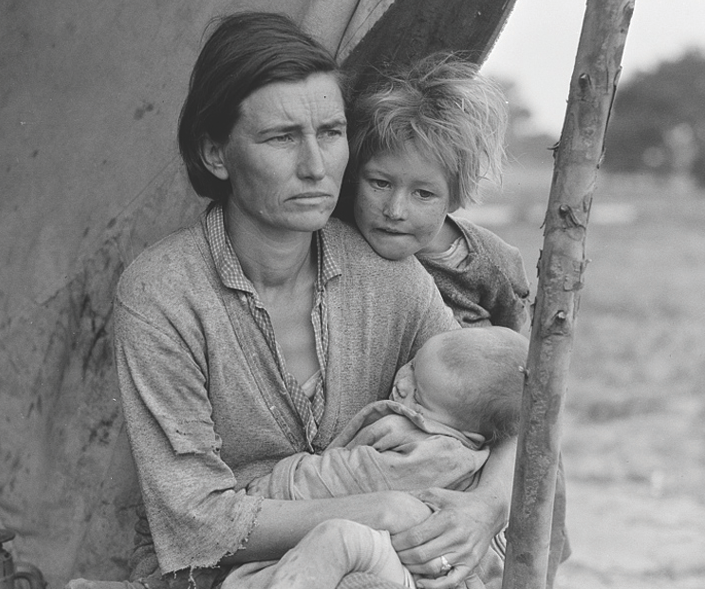Podcast Corner
 Episode Twenty-five:
Episode Twenty-five:
Overlooked Injustice: The Children's Village at Manzanar

CSU Japanese American Digitization Project
Search oral histories, photographs, and other ephemera from COPH’s Japanese American collections on the CSU Japanese American Digitization Project website.
This collaborative website brings together collections from 14 CSUs, including CSUF. The central purpose of the California State University Japanese American History Digitization Project is to improve access to CSU archival collections about the history of Japanese Americans and to develop a functional model for ongoing planning and collaboration among the CSU archival and library community.
Dorothea Lange's California: 1935-1942
Exhibition: October 1–December 31
Exhibition Reception: Sunday, October 1, 1–3 p.m.
In her government photography in 1930s and 1940s California, Dorothea Lange exposed the complexities of American identity in a time of economic and civil insecurity. Throughout the Great Depression and World War II, Lange changed her entire focus from portraiture to documentary photography. In so doing, she made some of the most evocative images in American history. Lange’s commitment to a democratic society and to documenting the dignity of people enduring hardship challenged the idea of the California dream. Dorothea Lange's California: 1935–1942 highlights Lange’s government work in California, drawing upon her extensive archive of images housed at the Library of Congress.
Be sure to check out Dorothea Lange’s California: 1935-1942, at the Great Park Gallery, Palm Arts Complex, Irvine. Dr. Cawthra’s fall 2022 Visual History class students contributed to this exciting new exhibition!

Giving Back to Preserve History
“Each day we lose a story, so it’s great to see a program we think will inspire people and train students in techniques to record those stories. I think it will make a major difference in what we learn. There are so many untold stories in Orange County about so many different aspects of Orange County." - Wylie Aitken
The Bette and Wylie A. Aitken Community Room is part of our recently opened Lawrence de Graaf Center for Oral and Public History, a component of CSUF’s Department of History and College of Humanities and Social Sciences. The Aitkens donated $500,000 in October toward the COPH. Additionally, the gift received $250,000 in matching funds from the $40 million gift provided by MacKenzie Scott and her husband Dan Jewett to CSUF in July.
Read more about the Aitkens’ generous donation in the OC Register’s December 12, 2021 article![]() .
.
Mission Statement:
The Lawrence de Graaf Center for Oral and Public History (COPH)—a component of the Department of History![]() and the College of Humanities and Social Sciences at California State University, Fullerton—embraces a three-fold mission. First, COPH collects and preserves the stories of distinctive individuals and diverse communities whose historical experiences have shaped the collective memory of Southern California, defined national and transnational identities, and reflected life in an era of globalization. Second, COPH undertakes and provides support services for public history projects, particularly those designed to share oral histories with public audiences in Southern California and beyond. Third, COPH trains CSUF students in the research methods of collecting oral histories, interpreting these histories, and presenting important regional, national, and global stories to the public. Ultimately, COPH seeks to combine the strengths of oral history and public history in order to build better connections between Cal State Fullerton and the communities—local, national, and global—to which it is tied.
and the College of Humanities and Social Sciences at California State University, Fullerton—embraces a three-fold mission. First, COPH collects and preserves the stories of distinctive individuals and diverse communities whose historical experiences have shaped the collective memory of Southern California, defined national and transnational identities, and reflected life in an era of globalization. Second, COPH undertakes and provides support services for public history projects, particularly those designed to share oral histories with public audiences in Southern California and beyond. Third, COPH trains CSUF students in the research methods of collecting oral histories, interpreting these histories, and presenting important regional, national, and global stories to the public. Ultimately, COPH seeks to combine the strengths of oral history and public history in order to build better connections between Cal State Fullerton and the communities—local, national, and global—to which it is tied.
Description of activities and goals:
With over 6,000 recorded interviews and related transcripts, photographs, and other materials, COPH maintains the largest oral history archive in the state of California. The collection stands out nationally for its grassroots nature and the wide range of communities represented. The genesis of this archive came with the creation of a student-driven oral history program at Cal State Fullerton in 1968. Today, we continue to train students to create oral histories and generate new collections. We recognize that certain obligations accompany ownership of these collections, in particular the maintenance of a suitable storage environment and access for users, including students, scholars, educators, community members, journalists, filmmakers, and policy makers. We endeavor to employ the most appropriate, up-to-date technologies to achieve both of these ends.
The public history projects that COPH undertakes and supports include projects designed not only to tell the stories of Southern California but also to connect those stories to national and global contexts. COPH’s public history projects, like its oral history projects, are student-driven. COPH trains students to curate museum exhibitions, engage in historic preservation initiatives, and complete other projects related to community history, public art and culture, oral history performance, heritage tourism, digital history, and archival management. Many of these projects are collaborative and serve as capstones for graduate students pursuing the M.A. in History.
COPH’s highest goal is to provide service to students, researchers, and the public. An array of courses, projects, and internships prepare students to become engaged community members and global citizens, effective historians and educators, and successful public history professionals. Groundbreaking oral history projects, sponsorship of the Hansen Lectureship and Fellowship in Oral and Public History, and full array of support services for researchers make COPH a vibrant center of scholarly and creative activity. Oral history workshops, consultation services, and community-based projects allow COPH to serve the diverse communities whose members have shared their memories with us.
Description of activities and goals:
With more than 5,000 recorded interviews and related transcripts, photographs, and other materials, COPH maintains the largest oral history archive in the state of California. The collection stands out nationally for its grassroots nature and the wide range of communities represented. The genesis of this archive came with the creation of a student-driven oral history program at Cal State Fullerton in 1968. Today, we continue to train students to create oral histories and generate new collections. We recognize that certain obligations accompany ownership of these collections, in particular the maintenance of a suitable storage environment and access for users, including students, scholars, educators, community members, journalists, filmmakers, and policy makers. We endeavor to employ the most appropriate, up-to-date technologies to achieve both of these ends.
The public history projects that COPH undertakes and supports include projects designed not only to tell the stories of Southern California but also to connect those stories to national and global contexts. COPH’s public history projects, like its oral history projects, are student-driven. COPH trains students to curate museum exhibitions, engage in historic preservation initiatives, and complete other projects related to community history, public art and culture, oral history performance, heritage tourism, digital history, and archival management. Many of these projects are collaborative and serve as capstones for graduate students pursuing the M.A. in History.
COPH’s highest goal is to provide service to students, researchers, and the public. An array of courses, projects, and internships prepare students to become engaged community members and global citizens, effective historians and educators, and successful public history professionals. Groundbreaking oral history projects, sponsorship of the Hansen Lectureship and Fellowship in Oral and Public History, and full array of support services for researchers make COPH a vibrant center of scholarly and creative activity. Oral history workshops, consultation services, and community-based projects allow COPH to serve the diverse communities whose members have shared their memories with us.
Description of Activities and Goals:
With more than 5,000 recorded interviews and related transcripts, photographs, and other materials, COPH maintains the largest oral history archive in the state of California. The collection stands out nationally for its grassroots nature and the wide range of communities represented. The genesis of this archive came with the creation of a student-driven oral history program at Cal State Fullerton in 1968. Today, we continue to train students to create oral histories and generate new collections. We recognize that certain obligations accompany ownership of these collections, in particular the maintenance of a suitable storage environment and access for users, including students, scholars, educators, community members, journalists, filmmakers, and policy makers. We endeavor to employ the most appropriate, up-to-date technologies to achieve both of these ends.
The public history projects that COPH undertakes and supports include projects designed not only to tell the stories of Southern California but also to connect those stories to national and global contexts. COPH’s public history projects, like its oral history projects, are student-driven. COPH trains students to curate museum exhibitions, engage in historic preservation initiatives, and complete other projects related to community history, public art and culture, oral history performance, heritage tourism, digital history, and archival management. Many of these projects are collaborative and serve as capstones for graduate students pursuing the M.A. in History.
COPH’s highest goal is to provide service to students, researchers, and the public. An array of courses, projects, and internships prepare students to become engaged community members and global citizens, effective historians and educators, and successful public history professionals. Groundbreaking oral history projects, sponsorship of the Hansen Lectureship and Fellowship in Oral and Public History, and full array of support services for researchers make COPH a vibrant center of scholarly and creative activity. Oral history workshops, consultation services, and community-based projects allow COPH to serve the diverse communities whose members have shared their memories with us.

